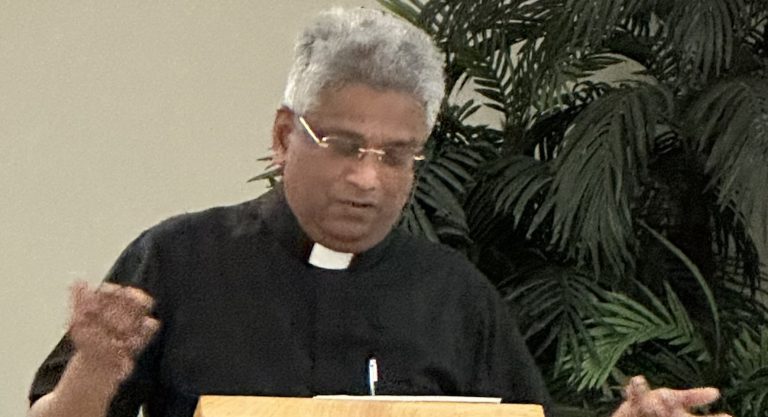SEVENTH SUNDAY IN ORDINARY TIME
First Reading • 1 Samuel 26.2, 7-9, 12-13, 22-25
Psalm 103
Second Reading • 1 Corinthians 15.45-49
Gospel • Luke 6.27-38
Homily
Charlie Roberts and his wife Amy were devastated when their first child, a daughter, died after only twenty minutes of being born. Though they went on to have three other children, Charlie could not get over the pain of the loss of his first child.
He blamed God for not allowing the baby to live. For nine years, it ate him up inside. He could not forgive God, and it turned him into a bitter man.
Finally, he decided that he was going to do something about it. So, on October 2, 2006, he took several guns and went to a one room school house run by the Amish in Lancaster County, Pennsylvania, where about 26 children between the ages of 6 and 13 were beginning their school day.
The Amish are a people who for centuries have tried to separate themselves from the wider society to practice their faith and raise their families. They are known for striving to practice a strict, literal interpretation of Jesus’ teaching.
On that morning in 2006, Charlie Roberts walked into the school house and told all the adults and boys to leave, with only 10 young girls remaining with him. He forced them to lie down on the ground and tied their hands and feet.
All the while he told them that he was angry at God and that he was hurting them to get back at Him. By the time the police arrived, he had shot all 10 girls and then turned the gun on himself. All ten girls eventually died of their wounds.
The community was shocked that such a tragedy could take place among such peace-loving people. When the news spread, people from all over came to Lancaster County to show their support for the families who lost their daughters.
About four million dollars was raised to help the grieving families.
Normally, a tragic story like this ends simply with people trying to cope with their loss and move on. But there was another chapter to this story, one that would inspire everyone who heard it.
The Amish community not only supported the families who lost their daughters in the shooting. They also reached out to comfort and offer forgiveness to the shooter’s wife and three children.
Many Amish people went so far as to attend the funeral of the shooter to make it clear that they had forgiven him from their heart.
Though they had every reason to be resentful and bitter because of their tragic loss, they chose to show mercy.
During those sad days, the Amish were often asked how they could forgive someone who had done something so senseless to ten innocent young girls.
Their answer was simple. Jesus made it clear that we must forgive those who harm us, and to leave vengeance to God. They were simply following the teachings of their master.
This sad and beautiful story shows us two sides to forgiveness.
The first side is the story of what can happen to someone who fails to forgive. Bitterness and resentment twisted the conscience of a man who was probably no different from you and me.
Being unable to forgive God poisoned his heart with so much hatred and anger that he was able to do the unthinkable – kill ten innocent young girls.
His mind had become so warped by rage that he thought that he could get even with God by doing something so horrible. However, he only ended up causing more grief and pain.
The other side of the story is the willingness of those ten families to forgive the man who took their daughters away from them. They wouldn’t allow themselves to drink the poison of rage. They chose love instead – love for their daughters’ killer and love for his family. And in so doing, turned that tragedy into an example of the transforming power of forgiveness.
Of all Jesus’ teachings, perhaps the one on forgiveness is the most difficult to put into practice. If we are honest, all of us are probably holding on to some resentment because of hurts from our past.
Nothing good comes from failing to forgive. All it does is make us bitter and resentful.
In a real way, we are letting that person hurt us over and over again by keeping the memory of what they did to us alive. The only way to resolve that pain is to let it go – to forgive.
How can we do that? By remembering how much God has forgiven us. All of us have sinned, yet God continues to forgive us. He sent Jesus not to condemn us – but to die for us so that we could be saved.
The other thing we must remember is that forgiveness is not optional. We must forgive if we want to be forgiven.
As Jesus taught us to say in the Our Father, “forgive us our sins as we forgive those who sin against us.” If we do not forgive others their sins, then we cannot expect God to forgive us ours.
It is not easy, and it will not happen overnight. But, if those families could forgive the killer of their daughters, we can forgive whatever harm others have caused us. Then we will be at peace, free from carrying the burden of resentment and anger.

